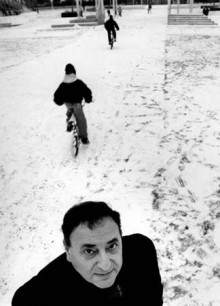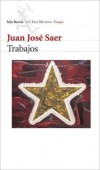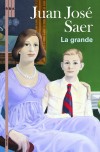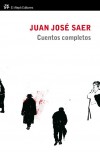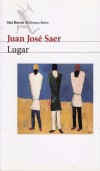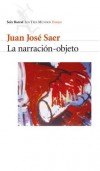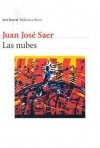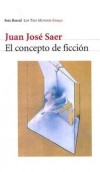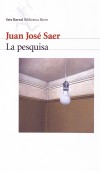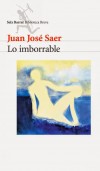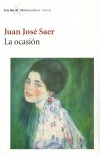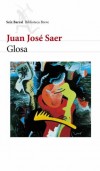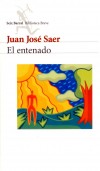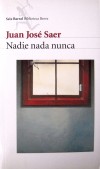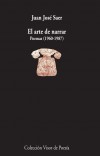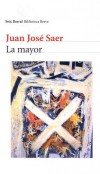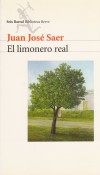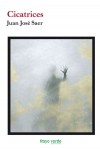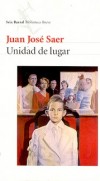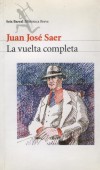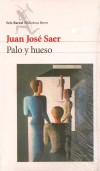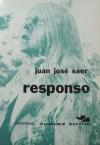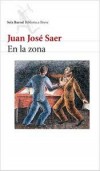Juan José Saer
ARGENTINA, 1937 - PARIS, 2005
NADAL PRIZE, 1986
FRANCE CULTURE PRIZE, 2003
UNIONE LATINA DI LETTERATURE ROMANZE PRIZE, 2004
Juan José Saer is the leading Argentinian writer of the postBorges generation considered one of the most important in Latin American literature and in Spanish-language literature of the century XX. In 1968, he moved to Paris and taught literature at the university in Rennes, Brittany. Saer's work often builds on particular and highly codified genres, such as detective fiction (The Investigation), colonial encounters (The Witness), travelogues (The river without a shore), or canonical modern writers. His work is translated into all major languages.
“Saer has constructed an extraordinary architecture based on a multitude of infinitely intercut plans […] one could say that saer has read all literature, listen to every kind of music, debated all the philosophers, and that the mixed waters of the rio de la Plata sweep along a joyful and inimitable discourse that flows between the shores of all cultures.”
LE MONDE
"Many of us search in literature what Saer found in a perfect way. He challenges us in a way only done also by Borges: the dilemma of how to write after what they did".
MARTÍN KOHAN
“To say that Juan José Saer is the best contemporary argentinean writer is to do an injustice to his achievement. More exact would be to say that Saer is one of the best contemporary writers in any language and that his work, like that of Thomas Bernhard or Samuel Becket, exists beyond all frontiers, in that no man's land which is the unique region of literature.”
RICARDO PIGLIA
"A perfect writer from the very start."
BEATRIZ SARLO
«With meticulous prose, Saer's novel captures the wilderness of human experience in all its variety, as well as the "blind, incomprehensible, ceaseless drift" of time.»
JASCHA HOFFMAN, about Glosa (The Sixty-five years
of Washington), on THE NEW YORK TIMES
«The most important Argentinean writer since Borges»
THE INDEPENDENT
«Juan José Saer must be added to the list of the best South American writers.»
LE MONDE
«Saer's literary project is based on a conviction that at least a few of us share: it is not a question of what to tell, but how to tell»
ENRIQUE ZATTARA, REVISTA PERRO NEGRO
«Saer is a master of language, a magician who constructs sentences that fly over the reader, incite reflection and submerge him in a constellation of words and expressions.»
EDUARDO IRUJO, PAPEL EN BLANCO
PUBLISHED BY: Latin America SEIX BARRAL | Spain EL ALEPH / RAYO VERDE | Arabic AL KARMA / ASEER AL-KOTOB / JADAL | Brazil COMPANHIA DAS LETRAS / EDITORA7LETRAS | Bulgaria COLIBRI / PANORAMA | China THE WRITERS PUBLISHING HOUSE | Colombia LAGUNA | Corea MARCO POLO PRESS | Costa Rica LANZALLAMAS | Czech Republic RUNA | Denmark FORLAGET SIDSTE AUHUNDREDE | Finland FABRIIKKI KUSTANNUS | France SEUIL / LE TRIPODE | Germany WAGENBACH | Greece KONDYLI | Israel CARMEL | Italy LA NUOVA FRONTIERA / NOTTETEMPO | Japan SUISEISHA | English Worldwide OPEN LETTER | Mexico ELEFANTA DEL SUR | Poland TAiWPN / ARTRAGE | Romania VREMI EDITURA | Türkiye JAGUAR KITAP
By Juan José Saer
-
ESSAY, 2006
Written by one of the greatest Argentine writers, the attraction of these articles on literature is twofold: they provide passionate readers with valuable information while also dazzling with the...
-
NOVEL, 2005
Final novel, this vast gallery of characters described in a vivid and meticulous style is also a compendium of the entire work of Saer and the culmination of his literary project. Another return...
-
SHORT STORIES , 2001
Saer, one of the greats of 20th Century literature, introduced a new, intense and oblique way of reading. An approach in which the reader participates -almost as in an ancient rite- in places and...
-
SHORT STORIES, 2000
Lugar (Place) is remarkable for its creative richness and the audacity with which it conveys the infinite places of time, space, the imagination and memory through brief tales. What is a...
-
ESSAY, 1999
Saer writing down his readings. If, as Saer said, criticism is a superior form of reading, then at its best it can provide masterful literary texts such as the ones that make up La...
-
NOVEL, 1997
Las nubes (The Clouds) tells the story of a young psychiatrist who takes five insane people to a clinic, travelling from Santa Fe to Buenos Aires. With him go thirty-six characters: mental...
-
ESSAY, 1997
El concepto de ficción (The Concept of Fiction) is a compilation of all of Juan José Saer's essays up to 1997, non-fiction work by a writer who was undoubtedly one of the most...
-
NOVEL, 1994
This labyrinthine work by Juan José Saer contains two parallel investigations into the complexities of madness, memory and crime. The cases; the famous mystery of a series of murders in...
-
NOVEL, 1993
In clear, direct prose, the plot of Lo imborrable (Permanent) sees Carlos Tomatis wandering through a ghost town. His meeting with a pair of strange characters, Alfonso and Vilma, brings up a...
-
ESSAY, 1991
In El río sin orillas (The River Without a Shore), history and culture, the past and present come together in Saer's tight, vigorous writing, which organizes events into a specific order...
-
NOVEL, 1986
La ocasión (The Event) tells the tale of Bianco, a master of the occult who must leave Europe hounded by what he calls "the conspiracy of the positivists of Paris”, settling...
-
The Sixty-Five Years of Washington
NOVEL, 1985
An ironic, sentimental journey, Glosa (The Sixty-Five Years of Washington ) concentrates on incidental events and epiphanies, the most important aspects of the world of Juan José Saer...
-
NOVEL, 1983
In sixteenth-century Spain, a cabin boy is bound for the New World. An inland expedition ends in disaster when it is attacked by Indians, leaving the young boy, as sole survivor, to face his fate...
-
NOVEL, 1994
What discourse can really offer the complexity of the real life? How many versions of history are possible? At a bend in a river, some men share images and memories, between a suffocating...
-
POETRY, 1977
"It doesn't matter what city one is in / they're always in their home land." For Juan José Saer, that land is language. He moves with his fiction but he amazes with his poetry, achieving a...
-
SHORT STORIES, 2006
"What can you expect of a man who takes naps? Nothing but a stream of dense, raw fragments. The world might well shine brightly within them, if the world is capable of shining brightly." Thus...
-
NOVEL, 2010
A family who live on the Santa Fe coast meet on the morning of the final day of the year to prepare for the celebrations that night, when a lamb will be roasted. Two absences afflict the central...
-
NOVEL, 2003
Luis Fiore, a metalworker, murders his wife on the 1st of May. The episode serves as a basis for the four stories that make up this novel by Juan José Saer, originally published in 1969....
-
SHORT STORIES, 1967
The formal rigour of modernist narrative and an intensely poetic perception of the world are the two main pillars on which this story collection, a keystone of Argentine literature, is...
-
NOVEL, 1966
Places, phrases, sensations and characters return over and over again in Saer's stories to reference the fragments, experiences, memories and perceptions bouncing around the author's imagination....
-
SHORT STORIES, 1965
The four stories that make up the volume Palo y hueso (Stick and Bone), written between 1960 and 1961, first appeared in 1965. Already, Saer was exploring what would become the centre of the...
-
NOVEL, 1964
In just over six hours, from the onset of night to dawn the next day, Barrios will realize that the past, although recent, has become definitive. How had things happened? And, more importantly,...
-
SHORT STORIES, 1960
With now classic texts such as Tango del viudo (Widower's Tango) and Fuego para Rivarola (A Light for Rivarola), and characters who the reader can easily identify and empathize with -Tomatis,...
Provença 293, 4-1 - 08037 · Barcelona +34 93 832 70 88 · · Member of ADAL
